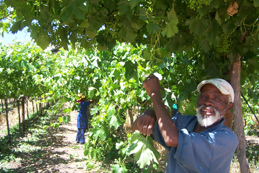
Case Study
Zandberg Estate
Olifants River
The project started in October 2006 as an initiative from the previous
landowner, Dr André Neethling, who wanted his workers to become
more involved in the business. Zandberg Citrus
Estate empowerment project is managed by a 50% Suiderland Farms (Pty)
Ltd share and a 50% Zandberg Workers’ Trust share.
According to Detré Baard, farm manager on Welverdiend Estate, their long term vision is to assist beneficiaries to stand on their own feet and to generate their own income. At the moment the project is still sustained by way of grants. “In about 2-3 years from now, the project will enable every family member to improve their living standards and to take care of the needs of their children”says Detré.
A total of 34 beneficiaries and their families are ’reaping the fruits’ from this initiative. In addition, about 40 temporary workers are employed during citrus and table grape harvest times. Although beneficiaries are working in both the table grape and citrus commodities, growth of the workers’ trust is derived from citrus turnover at Zandberg Estate only.
The Zandberg Workers’ Trust comprises Johanna Jooste (chairperson),
Kevin Oktober, Magdaleen
Beukes and Adriaan Koopman. Since the project was established, a number
of workers have progressed to management level.
“We get up each morning to develop people into managers of their unique fields of speciality,” says Detré. “All trustees have attended management and financial courses.”
The Zandberg Workers’ Trust aims to empower people in their careers and in their day to day life skills. A variety of courses are presented by OPI. Courses are all SETA-registered and workers receive certificates upon completion of their training. Today, some workers who are ‘knowledge- empowered’, in turn, mentor the younger generation.
A permanent social worker takes care of family related needs and a life
coach has been appointed
to provide further assistance. All workers enjoy the benefits of the local
mobile health clinic, a comprehensive computer facility, an after-school
facility with qualified teachers and a crèche on each farm.
One challenge is to meet day to day capital requirements. For the first
four years Suiderland
Farms decided to stand in for daily expenses such as tractors, diesel,
crop protection and for urgent matters arising.
“It is not possible to pay dividends until the business shows a
profit. We believe that the living standards of all beneficiaries and
families will change once dividends are paid on a regular basis,”
says Detré.
Initially, the beneficiaries doubted that the project would be successful,
but later, as the trees increased in size, people realized that the benefits
might last for a lifetime.
For more case studies like this one, download our Power
of the Grape, 2nd edition pdf

